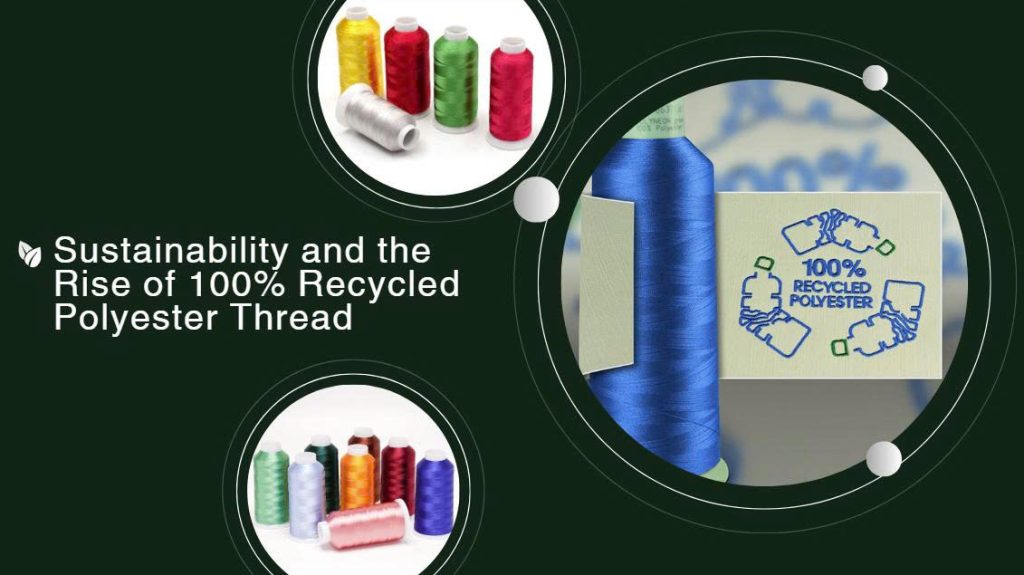Blog
Sustainability and the Rise of 100% Recycled Polyester Thread
Sustainability has evolved from being just an industry trend to a global priority for textile manufacturers. Among the innovative materials driving this change is 100% recycled polyester thread. But what makes recycled polyester special, and why is it increasingly favored by garment and home textile producers? This article explores its benefits, environmental contributions, cost factors, and why it might be the perfect choice for your next project.
What Is Recycled Polyester Thread?
Recycled polyester thread is created by converting plastic waste—most commonly post-consumer PET bottles—into durable sewing thread. The process involves collecting, cleaning, and shredding plastic waste, which is then melted and spun into fine polyester fibers. These fibers are further processed to produce strong, high-performance threads used in various applications, from apparel and outdoor gear to home décor.
Recycled threads are engineered for both strength and versatility, performing on par with, and often exceeding, the quality of conventional polyester thread, all while drastically reducing environmental harm.
Why Choose Recycled Polyester Thread?
Switching to recycled polyester thread offers both environmental and business advantages:
1. Growing Consumer Demand
Today’s consumers are more eco-conscious than ever. Research by Nielsen shows that nearly 73% of global shoppers are willing to change their buying habits to reduce environmental impact. Using recycled materials, including sewing thread, positions your brand to align with these evolving preferences.
2. Adapting to Industry Shifts
Major fashion and textile companies have pledged to integrate more sustainable practices by 2030. By using recycled threads now, manufacturers can get ahead of these industry benchmarks and build long-term partnerships with sustainability-driven brands.
3. Enhanced Brand Storytelling
Eco-friendly practices resonate with modern buyers. Featuring recycled polyester thread in your products allows you to market your brand as environmentally responsible—an advantage that strengthens customer trust and opens doors to eco-conscious retailers.
Key Benefits of Recycled Polyester Thread
1. Comparable Performance to Virgin Thread
2. Cost-Efficient Sustainability
Although initial costs may differ slightly, the long-term value—through brand loyalty, increased demand, and improved reputation—often outweighs the investment.
3. Versatile Applications
Recycled threads are suitable for:
4. Custom Options
Suppliers frequently offer customized color palettes, textures, and tensile strengths to meet unique project requirements.
How 100% Recycled Polyester Thread Is Made
The production process begins with collecting post-consumer plastic, mainly PET bottles. After sorting and cleaning, the plastic is shredded into flakes, melted, and extruded into polyester fibers. These fibers are then spun into uniform threads. Advanced quality control ensures that the final product equals or surpasses the performance of virgin polyester thread.
This closed-loop process helps divert plastic waste from landfills, significantly lowers energy and water use, and reduces carbon emissions associated with textile production—all while maintaining top-quality results.
Environmental Impact
Recycled polyester thread addresses multiple environmental challenges:
- 1Plastic Waste Reduction – Each kilogram of thread reuses about 60 PET bottles, preventing them from ending up in landfills or oceans.
- 2Lower Energy Use – Producing recycled polyester consumes up to 59% less energy compared to virgin polyester.
- 3Reduced Carbon Footprint – Fewer greenhouse gas emissions are released during the recycling process.
- 4Conservation of Natural Resources – By using existing plastic, reliance on petroleum-based materials is significantly reduced.
Cost and Market Availability
The price of recycled polyester thread depends on certifications, quality, and order volume. Bulk purchasing often helps lower costs, and the rising demand for eco-friendly materials has made recycled threads increasingly accessible. Look for suppliers with Global Recycled Standard (GRS) or similar certifications to ensure authenticity.
Recycled Polyester and the Slow Fashion Movement
The fast fashion industry’s wasteful practices have fueled the need for more durable, sustainable solutions. Recycled polyester thread enables manufacturers to produce garments with a longer lifespan—resistant to frequent wear and washing. By supporting circular fashion, these threads help reduce textile waste and encourage a “buy less, use longer” consumer mindset.
Shaping the Future of Textiles
Adopting recycled polyester thread signals innovation and a commitment to responsible manufacturing. Brands that embrace sustainable materials are not only meeting current consumer expectations but also preparing for stricter future regulations on sustainability.
Conclusion
Switching to 100% recycled polyester thread is both a smart and strategic move for textile manufacturers. It lowers your environmental footprint, supports brand credibility, and meets growing market demands for sustainability.
To begin, evaluate where recycled threads can replace conventional ones in your product line, partner with reputable suppliers, and seek certified eco-friendly options. By doing so, you’re investing in both your brand’s future and the planet.

